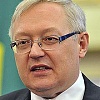Russia has repeatedly expressed concern over the creation of a ballistic missile defense system in Europe, approved in 2010 during a NATO summit in Lisbon. A group of European countries, including Poland, Romania, Spain and Turkey, agreed to deploy elements of the system on their territories.
The United States and NATO continue to claim that the ballistic missile defense system is aimed primarily at countering threats from Iran and North Korea.
"[At present], the issue of possible cooperation lies far beyond the horizon, and it is hard to imagine such cooperation considering the current problematic stretch in our bilateral relations," Ryabkov said in an interview with the Security Index magazine published on Monday.
He pointed out that the issues of possible revision and modernization of the US military strategy in the world and especially in Europe attracted a lot of attention of the Russian authorities.
"We must gather more information and receive more precise assessments of future US actions in this direction," Ryabkov added.
He suggested that the new US administration would focus more on territorial defense of the continental part of the United States.
“But basically I believe that the Republican administration will boost missile defense … acting in line with the policy of previous US administrations,” Ryabkov added.
The Anti-Ballistic Missile Treaty was signed by the United States and the Soviet Union in 1972 but in 2001 then-US President George Bush decided to withdraw from the agreement.
Russia Proposes Consultations With Washington on Cybersecurity
Moscow has proposed to hold joint expert consultations with Washington on cybersecurity issues, Ryabkov added.
"We have proposed to hold business-like expert consultations with participation of all interested sides to clarify this worrisome issue. It deals primarily with cybercrime, data theft, as well as violation of intellectual property rights," the diplomat said.
"We are not conducting destructive policies in relation to the United States, and our proposal remains valid, we will continue efforts on this issue," Ryabkov stressed.
The US Intelligence Community report claimed that Russia launched an influence campaign in 2016 aimed at undermining public faith in the US democratic process and creating a preference for President-elect Donald Trump.
Russia has repeatedly denied the US allegations calling them absurd and characterizing them as an attempt to divert public opinion from revelations of corruption as well as other pressing domestic issues.
After receiving an intelligence briefing on the US Intelligence Community's report, Trump said the election outcome had not been affected. US House of Representatives Speaker Paul Ryan also suggested that the assessment should not be used by partisans to delegitimize Trump's presidency.
Source: sputniknews.com




